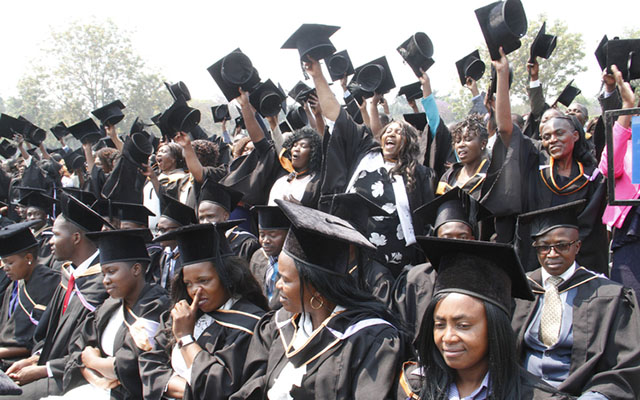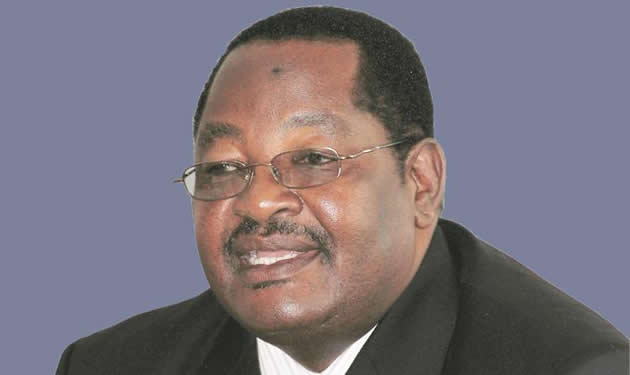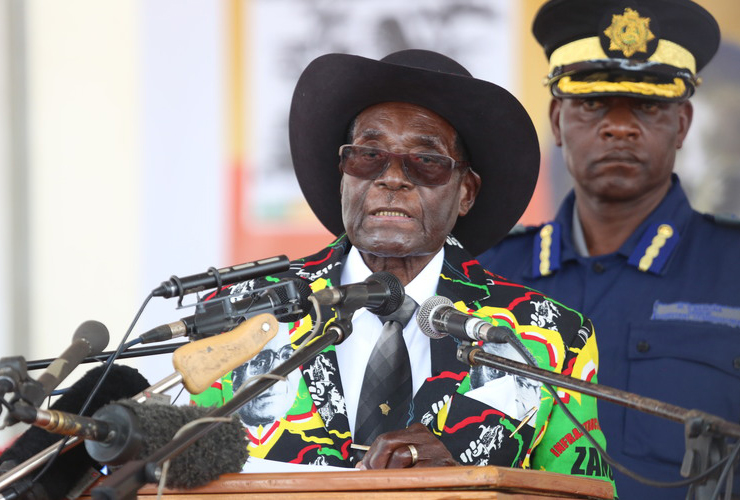President caps 2 423 at Nust

Mashudu Netsianda Bulawayo Bureau—
President Mugabe yesterday capped 2 423 students at the National University of Science and Technology (nust)’s 23rd graduation ceremony. The graduates were drawn from the Faculties of Applied Sciences, the Built Environment, Commerce, Communication, Information Science and Industrial Technology and Medicine. The colourful ceremony began at about 9am when President Mugabe, who is the Chancellor of all State universities, led the academic procession into the nust Sports Grounds where the graduands, their friends and relatives were waiting. He was accompanied by the nust acting Vice-Chancellor Professor Samson Sibanda, Vice President Phelekezela Mphoko, Higher and Tertiary Education, Science and Technology Development Minister Professor Jonathan Moyo, his deputy Dr Godfrey Gandawa, Home Affairs Minister Dr Obert Mpofu and State Security Minister Kembo Mohadi.
9am when President Mugabe, who is the Chancellor of all State universities, led the academic procession into the nust Sports Grounds where the graduands, their friends and relatives were waiting. He was accompanied by the nust acting Vice-Chancellor Professor Samson Sibanda, Vice President Phelekezela Mphoko, Higher and Tertiary Education, Science and Technology Development Minister Professor Jonathan Moyo, his deputy Dr Godfrey Gandawa, Home Affairs Minister Dr Obert Mpofu and State Security Minister Kembo Mohadi.
Also present were Small and Medium Enterprises and Cooperative Development Minister Sithembiso Nyoni, Bulawayo Provincial Affairs Minister Eunice Nomthandazo Moyo and her Matabeleland South counterpart Minister Aaron Maboyi Ncube.
Out of the 2 423 students who graduated, five were holders of Doctorates degrees, 733 Masters’ degrees, 1 616 undergraduates and 49 had post-graduate diplomas in different disciplines. Forty-six percent of the undergraduates were in STEM disciplines. Of the 1 616 undergraduate recipients, 64 passed with first class degrees, while at Masters level there were 99 distinctions.
There was also a marked improvement in the quality of passes, particularly at the postgraduate level where the figure jumped to 12,4 percent from 7,5 percent in the previous year. The male distribution is 54,8 percent, while 45,2 percent constituted female undergraduates, a slight improvement from last year’s 40,8 percent. The number of male undergraduates this year declined compared to last year’s 59,2 percent.
There were also graduates in recently introduced degrees such as Masters of Business Administration in Strategic Management, Masters in Ecotourism and Biodiversity. Among those who graduated were the reigning Miss Tourism Zimbabwe, Ashley Morgan, who was crowned during her final year while pursuing a degree in marketing and former Chronicle interns, Shamiso Dzingire and Bulisile Mguni
In his report, Professor Sibanda said despite numerous challenges, the university made great strides in redirecting nust to the realisation of its mandate as a STEM university. “To this end, Part 1 intake for the 2017/18 academic year stands at 2 299 students, of whom 1 376 represent STEM compared to 923 for non-STEM disciplines,” he said.
“Of this number, the gender distribution is 1 325 (57,6 percent) males and 974 (42,4 percent) females. The graph is skewed towards STEM and what looked like a pipe dream of 70 percent STEM and 30 percent non-STEM, is now a reality.”
Prof Sibanda said the surrogacy of Gwanda State University (GSU) by Nust since 2012 ended on August 4 this year when they handed over the new university to its council. He said nust had renewed efforts at reviving construction on campus in partnership with well-wishers who donated building materials and labour.
Prof Sibanda said they increased the number of parallel and block release programmes and diversified delivery mode, with several modules being offered using various e-learning management systems. In terms of human capital, Prof Sibanda said in line with ZIMCHE requirements, 16 staff members acquired PhDs in 2017 through the Staff Development Office.
The university now has 83 lecturers with PhD degrees out of 395. Prof Sibanda said their vision was to transform nust into an international centre of excellence in science and technology for sustainable development by 2025.
“It is for this reason that our Department of Fibre and Polymer Materials Engineering engaged rural communities on issues to do with value addition and beneficiation of their fibrous materials, hides and skins included, to improve the quality of leather products and contribute to improved lifestyles,” he said.
Prof Sibanda said the university was in the process of developing an abattoir complex in Lupane in partnership with a number of stakeholders.
The university has also registered the first rural leather cooperative in Gwanda, which produces shoes for school children and miners in the surrounding areas. The colourful ceremony was marked by captivating musical interludes from the nust choir and the Zimbabwe National Army band.











Comments